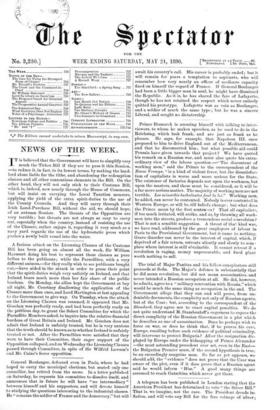Prince Bismarck is amusing himself with talking to inter- viewers,
to whom he makes speeches, as he used to do in the Reichstag, which look frank, and are just as frank as he pleases. He says, for example, that Napoleon III. once proposed to him to drive England out of the Mediterranean, and that he disconcerted him ; but what possible aid could Prussia have given towards that project P We have quoted his remark on a Russian war, and must also quote his extra- ordinary view of the labour question :—" The discontent of working men," said the Prince to the correspondent of the Novoe Vremya, "is a kind of violent fever, but the dissatisfac- tion of capitalists is worse and more serious for the State. The existence of factories depends not upon the workmen, but upon the masters, and these must be considered, or it will be a far more serious matter. The majority of working men are not terrible. Les minorites turbulantes font la loi." Working men, he added, can never be contented. Nobody is ever contented in Western Europe, or will be, till beliefs change ; but what does the Prince mean by the first senteni3es ? That all capitalist, if too much irritated, will strike, and so, by throwing all work- men into the streets, produce a tremendous social convulsion ? That is not a sensible suggestion. A threat of that kind was, we have read, addressed by the great employers of labour in Paris to the Provisional Government, but it came to nothing. Grave disorder can never be the interest of capital, which, if deprived of a fair return, retreats silently and slowly to som place where interest is still obtainable. It cannot retreat if a revolution is raging, money unprocurable, and fixed plant worth nothing to sell.


































